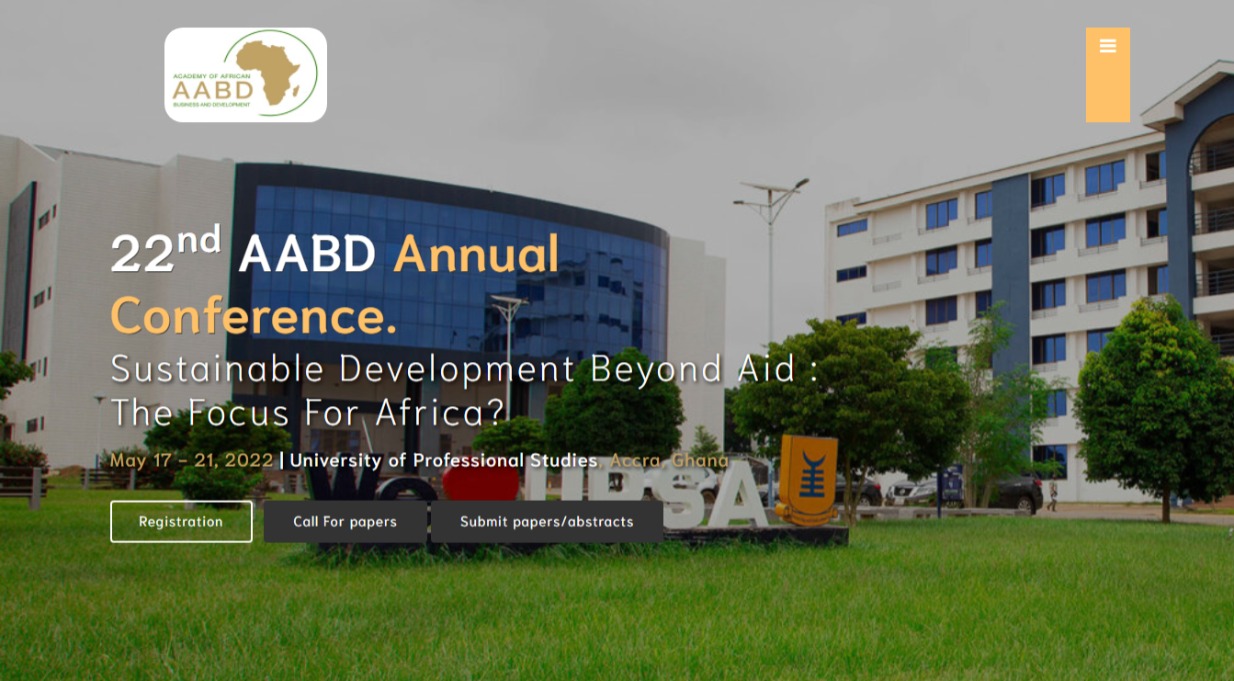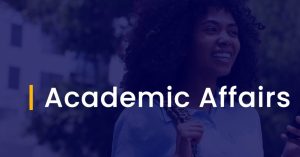The Academy of African Business and Development (AABD) invites researchers, business practitioners, consultants, community leaders, and policy makers to submit full papers, abstracts, and special session proposals for the 22nd AABD annual conference to be held at the University of Professional Studies, Accra, Accra, Ghana, from May 17 to May 21, 2022.
The AABD annual conferences aim at facilitating multidisciplinary research by stimulating collaborations between Africa based researchers and professionals and their counterparts around the world, by broadening and deepening global understanding of various issues relevant to Africa’s business and development, as well as advancing solutions to some of her challenges.
Background
Africa has been and continues to be reliant on international aid for its development. Though the volume of international aid received may be relatively small compared to its total annual expenditure, it represents a substantial part of the discretionary funds available to governments once statutory payments, wages, and salaries, and debt repayments have been set aside. International aid, therefore, is one of the key sources of funding for ongoing development projects in many nations.
Studies on aid effectiveness abound, but the contradictory nature of the research findings calls for more discussion and further research on the subject. Amidst the growing criticism of negative effects of international aid to Africa, the President of the Republic of Ghana, Nana Addo Dankwa Akufo-Addo has proposed a Ghana Beyond Aid vision, urging the creation of “…a Ghana that is beyond dependence on the charity of others to cater for the needs of its people, but instead engages with other countries competitively through trade and investments and political cooperation for enhanced regional and global peace and security.” It is argued that the emphasis is on the efficient and effective mobilization and use of resources to grow out of the dependence on aid rather than a rejection of aid (Ghana Beyond Aid Charter and Strategy Document, Government of Ghana, 2019).
A Zambian economist, Dambisa Moyo, in her book, Dead Aid: Why Aid is Not Working and How There is a Better Way for Africa, opined that the greatest myth of our time is that billions of dollars in aid sent from wealthy countries to developing African nations has helped to reduce poverty and increase growth. Much like President Akufo-Addo, she advocates for institutional change and an Asian Development model – a focus on Foreign Direct Investments and Trade not Aid.
The Director-General of the WTO, Dr. Ngozi Okonjo-Iweala, argues that we should move from simplistic debate such as aid versus private sector, aid versus trade, etc. The issue she opined should be about how to get collaborative, multifaceted models that brings a partnership of governments, non-governmental organizations, donors, the private sector, and ordinary African people taking charge of their own lives. She argued that developed countries utilize Aid to better their economies, citing the example of Spain which got 10 billion dollars in Aid from the EU.
The conference theme, “Sustainable Development Beyond Aid: The Focus for Africa?” calls for further consideration of this new orientation. Should it be the focus of sustainable development of Africa? If so, how is this to be achieved? What are the challenges to implementation? These and many other issues require the critical attention of researchers, business practitioners, community leaders, and policy makers.
You are invited to submit any original theoretical, conceptual, empirical, and managerial contributions that address the conference theme or fit into one of the following conference tracks. Authors who are uncertain of the appropriate track for their submissions should contact the Program Co-Chairs.
Conference Tracks
Track 1: Accounting, Finance, and Investment
Track 2: International Aid, Economic Policies and Strategies
Track 3: Entrepreneurship, Small Business and the Informal Sector
Track 4: Exporting, Internationalization and Foreign Direct Investment
Track 5: Information and Communication Technology (ICT) and Digital Transformation
Track 6: Human Resources Management and Organizations
Track 7: Sustainability, Business Ethics and, Social Responsibility
Track 8: Marketing and Consumer Behavior
Track 9: Operations and Logistics/Supply Chain/Project Management
Track 10: Graduate Student Papers*
Track 11: Research Methods Track 12: Special Sessions*
Track 13: Local and Community Development
Track 14: COVID-19 and Business in Africa
Special Sessions
Those interested in organizing a special session should prepare a description of its overall purpose and include the abstracts of the different contributions. A special session should have at least 3 contributors. In addition, proposals must state the purpose, format and names of contributors. All special session proposals should be submitted to the Special Session Track.
Graduate Student Papers
Graduate students are encouraged to submit their papers to Track 10: Graduate Student Paper. This track will provide graduate students with the opportunity to share their work with current and future colleagues. Attending the conference will provide participating students with the opportunity to network with many of today’s leading scholars.
Submission of Papers/Abstracts
Full papers, abstracts, and special session proposals should be submitted directly to the 2022 conference submission portal. Full papers will be peer-reviewed to be published in the conference proceedings. Abstracts will be considered for presentation only. You are welcome to volunteer to participate as session chairs and reviewers to track chairs.
Publication Opportunity
Journal of African Business
Important Deadlines
| Abstract, full papers and special session submissions | January 31, 2022 |
| Notification of acceptance | March 01, 2022 |
| Early registration fee payment | March 15, 2022 |
| Payment of registration fee for papers to be included in program | April 05, 2022 |
Conference Contacts
| Prof. Mohammed Ibrahim Research and Consultancy Centre +233 20 819 9881 [email protected] |
Mrs. Aba Lokko Public Affairs Directorate +233 24 431 1966 [email protected] |
Submission details and other relevant conference information are available at: https://theaabd.org/2022-conference


